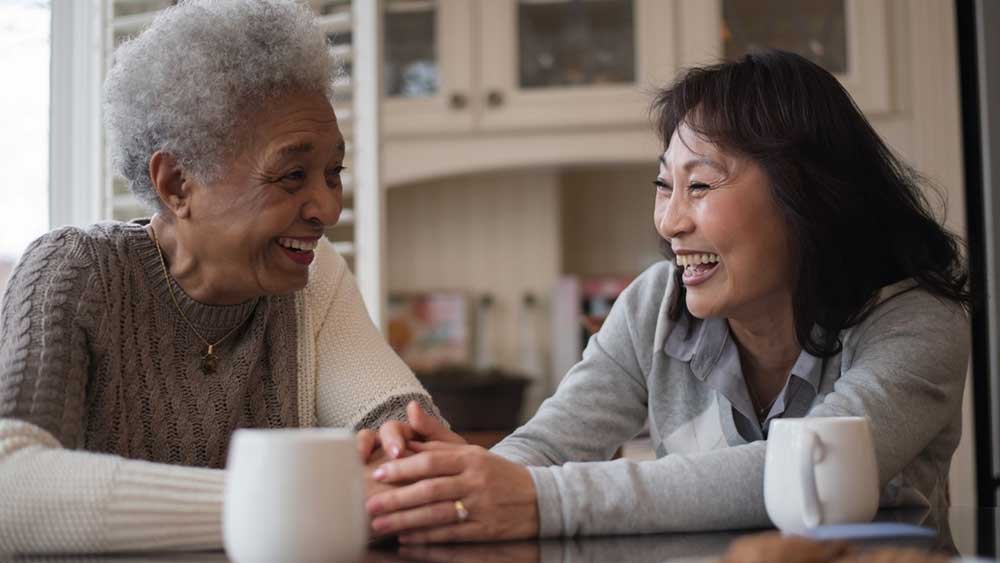

Having a Confidante Protects Brain Health
We all need someone to talk to—and new research from the New York University (NYU) Grossman School of Medicine shows that having a good listener in our life offers powerful brain health benefits, even slowing the development of Alzheimer’s disease.
For many years, doctors have known that the memory and thinking changes typical of Alzheimer’s disease are caused by specific changes in the brain, called amyloid plaques and neurofibrillary tangles. But today’s high-tech brain imaging has revealed that when two people have the same degree of brain changes, one may exhibit fewer outward signs of the disease than the other.
Neurologists attribute this to “cognitive resilience,” described by the NYU team as “a measure of your brain’s ability to function better than would be expected for the amount of physical aging or disease-related changes in the brain.”
We can improve our cognitive resilience with lifestyle choices such as healthy habits, physical exercise, mental stimulation, and most notably, social connectivity. An often-cited statistic is that loneliness and social isolation are as damaging to the brain as obesity or smoking 15 cigarettes a day!
The NYU team, headed by Dr. Joel Salinas, set out to determine which aspects of socialization are the most beneficial, and their research pinpointed a particularly potent factor. In the study, which was published in JAMA Network Open, the researchers said that “simply having someone available most or all of the time whom you can count on to listen to you when you need to talk is associated with greater cognitive resilience.” They found that people with high “listener availability” had the same cognitive abilities as a person four years younger who had low “listener availability.”
Dr. Salinas notes that cognitive decline can begin even when we’re in our 40s or 50s. “But today, right now, you can ask yourself if you truly have someone available to listen to you in a supportive way, and ask your loved ones the same. Taking that simple action sets the process in motion for you to ultimately have better odds of long-term brain health and the best quality of life you can have.”
Dr. Salinas recommends that doctors ask older patients about their social situations. Here are some of the barriers older adults face when it comes to having a supportive, trusted person in whom to confide:
- The death of one’s spouse usually means an abrupt drop in the availability of a listener. Often, spouses are each other’s main sounding boards, a readily available place to vent, share and receive understanding.
- Retirement often means the loss of daily contact with people who know us well and with whom we regularly share thoughts and information about our lives.
- When adult children move away and become busier with work and their own families, close conversations with parents can diminish.
- Mobility and transportation challenges make it harder to access opportunities for meaningful conversations with people in clubs, social organizations and our faith community.
- Top of mind during the pandemic is social distancing, which has saved the lives of many older adults but also has meant profound loneliness for many more.
How family members can help older loved ones overcome hurdles to good listener availability
You might fill some of that gap yourself. Be sure to get your loved one on the calendar. Visit if it’s safe. Set up frequent phone calls so trust and connection can build. If possible, help your loved one use FaceTime, Zoom or other virtual options. Ask questions that encourage your loved one to open up and share.
Encourage other family members to step up, as well. The more often we connect with an older relative, the more comfortable the conversations are likely to be. To facilitate meaningful connections between grandparents and grandkids, you might suggest some topics they can discuss. Try ice breakers such as “tell me about your first car” or “what was my dad like when he was a kid?” to help bridge the generation gap.
Practice good listening skills. The National Institute on Aging says older adults benefit when listeners speak slowly; allow time for the older adult to reply; avoid interrupting; make eye contact if it’s an in-person conversation; use frequent, brief responses such as “I see” and “uh-huh” to signal attention, and demonstrate empathy with phrases like “that must have been hard” or “thank you for sharing this with me.” If your loved one has hearing loss, be sure they can hear you and choose a quiet spot for your conversation.
Help your loved one make connections that could blossom into friendships. Suggest senior gatherings and other groups where there are people who share your loved one’s interests. This might be book clubs, support groups, or discussion roundtables. Today much of this activity also takes place in online support groups, discussion boards and social media. A recent study from Penn State University showed that when older adults had pleasant social interactions, whether in person or online, they scored higher on cognitive tests during the next few days!
Find ways your loved one can matter. In our ageist culture, the thoughts of older adults are often discounted and even avoided. “I have so much to share, but because I am old, no one listens,” many seniors sadly report. University of Toronto professor Markus Schafer confirms this, noting, “While the average 65-year-old may well have more wisdom than the average 30-year-old, the latter typically has more opportunity for actually dispensing advice.” Focus on environments where advice and the benefits of a life of experience are welcome—for example, mentoring, tutoring, schools and youth groups.
In-home care can help. If your family uses professional home care to help an older loved one manage health conditions and live safely at home, work with the caregiver to locate social opportunities for your loved one. And consider that spending time with the caregiver can provide emotional nourishment for your loved one. Your loved one and the caregiver will likely talk about their lives and learn about each other. Right at Home blog readers have undoubtedly read numerous accounts of the special bond between caregivers and clients. As you’re arranging for care, hire from a reputable agency that will match your loved one with a compatible caregiver.
Find your nearest Right at Home office here.







